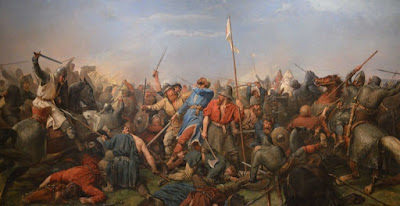A fleet of 330 ships arrived on English shores in 893, including wives and children, indicating their intent to colonize, not just plunder and go. They settled At Appledore and Milton, both in Kent, and Alfred set up men to keep an eye on their movements. Alfred started talks with Hastein, the Viking chieftain in Milton, but while doing so, the group at Appledore started moving northwestward. Alfred's eldest son, Edward, defeated them in Surrey. A siege at Exeter was defeated by Alfred. There were other battles, until by 895 the Danes were running out of food and supplies. They retreated to the Thames, and fortified themselves 20 miles north of London, but they were outmaneuvered by Alfred who blocked the river. In 897 they retreated, some to Northumbria, some to East Anglia, some to their ships and back to Europe.
Alfred lamented the effect of Danish raids on England, especially education:
...learning had declined so thoroughly in England that there were very few men on this side of the Humber who could understand their divine services in English or even translate a single letter from Latin into English: and I suppose that there were not many beyond the Humber either. [Alfred's preface to his translation of Pastoral Care]
Manuscript production also suffered during these years; there was also much destruction of manuscripts when Danes burned churches and monasteries. An 873 document is so poorly made that a historian suggests the scribe did not even know Latin. Alfred had established a school for his own children and others, where they studied both English and Latin. He encouraged learning, especially in English, for everyone who had a mind to apply themselves.
His reign produced many other improvements and changes in the culture, and I'll talk about them tomorrow, before we sk the question: Was Alfred really great?

No comments:
Post a Comment
Note: Only a member of this blog may post a comment.